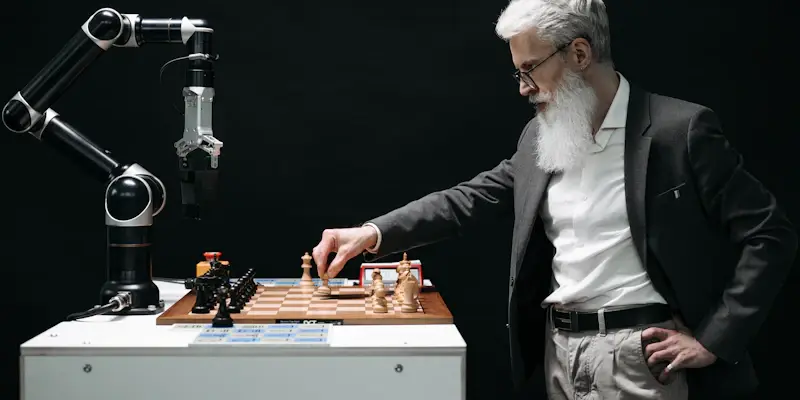The rise of generative AI (Gen AI) over the past two years has been a game-changer for businesses and organizations. With a significant portion of the workforce, particularly MBA and Master in Management students, using Gen AI multiple times daily, it’s evident that AI’s influence is growing.While the majority of workers believe AI will impact their jobs within the next three years, the key challenge is integrating AI in a manner that benefits both organizations and employees, enhancing efficiency and reducing burnout.
Understanding Cognitive Overload
The Burden of Multiple Technologies
In today’s work environment, employees often find themselves juggling multiple technologies, leading to cognitive overload and decreased productivity.The constant switching between applications and tasks puts an overwhelming strain on workers, causing stress and increasing the likelihood of errors. This technological multitasking is far from efficient and can be detrimental to both the employee’s well-being and the overall performance of the organization. Employers need to recognize the significance of cognitive overload and address it through the strategic implementation of Gen AI, which can help streamline processes and reduce the burden on employees.
Multitasking Myths
Contrary to popular belief, scientific insights have debunked the myth of effective multitasking.What appears to be multitasking is actually rapid task-switching, which disrupts focus and exacerbates errors and stress. The human brain is not wired for handling several tasks simultaneously with high efficiency, and trying to do so leads to a decline in work quality.Generative AI can offer a solution by reducing the cognitive load on employees. By managing routine tasks and providing seamless transitions between different activities, Gen AI allows employees to concentrate more effectively on their core responsibilities, ultimately boosting productivity and job satisfaction.
Effective Use of Gen AI
Automating Repetitive Tasks
Gen AI can play a crucial role in addressing modern work challenges by automating repetitive tasks, freeing up employees for more complex and meaningful projects. For instance, self-checkout systems in retail environments exemplify how automation allows workers to focus on customer interactions.Cashiers no longer have to be bogged down by repetitive scanning and transactions; instead, they can provide better service and improve the customer experience. By removing the mundane aspects of jobs, Gen AI not only enhances efficiency but also makes work more engaging and fulfilling for employees, which can significantly reduce burnout.
Supporting Emotional Engagement
In roles that require high emotional engagement, like customer service or healthcare, AI can be instrumental in managing stress and improving interactions. AI systems can analyze interactions and recommend actions to de-escalate stressful situations, ensuring that employees remain calm and composed under pressure. For example, in call centers, AI tools can help analyze conversations in real-time, providing agents with immediate feedback and suggestions to handle difficult customers more effectively. This not only leads to improved customer satisfaction but also reduces employee stress, creating a more supportive and productive work environment.
Coordinating Complex Processes
Streamlining Workflow
Generative AI has the potential to streamline complex processes that depend on inputs from multiple employees or departments, enhancing overall organizational efficiency.For instance, AI models used in medical coding and billing can significantly speed up reimbursement processes by coordinating various tasks and reducing the number of necessary steps for employees. These systems can automatically cross-reference data, detect discrepancies, and ensure accuracy, which otherwise would require considerable manual effort and time.By handling such complex processes seamlessly, Gen AI enables employees to allocate their time and expertise to more critical and challenging aspects of their roles.
Fostering Soft Skills
As AI takes over routine and repetitive tasks, the demand for soft skills such as clear communication, empathy, problem-solving, and teamwork becomes increasingly important. Employees are expected to excel in areas where AI cannot compete, such as understanding human emotions and providing personalized responses. This shift presents an opportunity for workers to develop and refine these essential skills, making them more valuable and effective in their roles.By fostering an environment where soft skills are prioritized and cultivated, organizations can achieve a more balanced and harmonious workplace, where human interaction complements technological advancements.
Focus on Human-Centered Value
Enhancing Creativity and Empathy
AI should be viewed as a tool to support human workers, not replace them. By allowing employees to focus on human-centric skills, organizations can enhance creativity, empathy, communication, and problem-solving capabilities within their teams.For instance, when AI handles administrative tasks, employees are free to engage in brainstorming sessions, collaborate on projects, and develop innovative solutions. This approach not only boosts productivity but also fosters a more dynamic and engaging work environment.Encouraging the development of creative and empathetic skills ensures that employees bring unique value that AI cannot replicate, leading to a more balanced and productive workplace.
Improving Work-Life Balance
The successful adoption of generative AI (Gen AI) can significantly transform work experiences by boosting efficiency while simultaneously reducing burnout. This balance is essential as it allows businesses to remain competitive and employees to adapt to new technological advancements, fostering a harmonious evolution in the workplace. The successful integration of AI can lead to increased productivity and job satisfaction, paving the way for innovation and sustainable growth.

